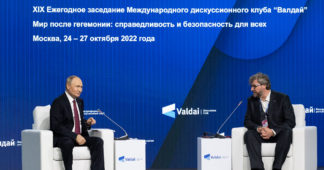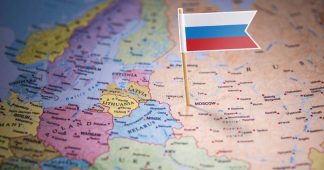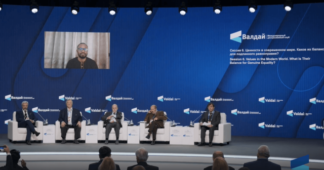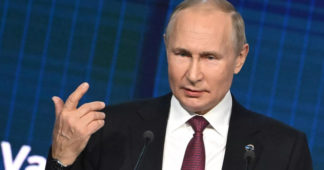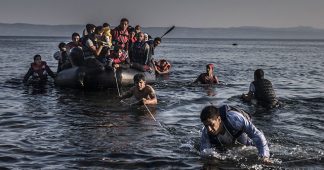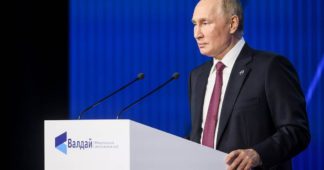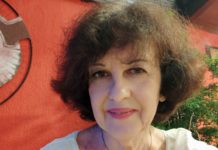The 21st Annual Meeting of the Valdai Discussion Club will be held on November 4–7, 2024 in Sochi, at the Polyana 1389 hotel complex. The name of this year’s event is “Lasting Peace on What Basis? Common Security and Equal Opportunities for Development in the 21st Century”.
According to the Club, the world order is currently undergoing a period of fundamental transformation. The changes taking place before our eyes do not simply imply the replacement of some leaders with others — they are stimulating the emergence of new principles for international relations, forms of interaction (primarily regional and interregional) and the desire to harmonise processes within the global community.
The contours of the future international configuration are not yet entirely clear, but Russia is already taking an active part in shaping them. This is first of all the case because of its total potential, which does not allow for Russia to be bypassed or ignored, even if some would prefer to do so. Due to historical, cultural and geopolitical circumstances, Russia is actually at the centre of this ongoing process.
The main idea of the discussions at the 21st Annual Conference of the Valdai Discussion Club is that the architecture of the system of international relations is moving towards a polycentric structure, but the world is not disintegrating into its constituent parts or losing its integrity. As a result, the presence of global problems implies that the entire world, with its aggregate set of approaches and ideas, is engaged in a search for solutions, not just the Western countries. The search for a unified project that can unite humanity beyond inevitable geopolitical differences to solve universal problems is extremely relevant. This is not about opposing the West; the complexity of the world palette and the growing influence of other powers with their cultures and experience does not allow for us to solely rely on the approaches and interests of a narrow group of countries. An efficient response to international challenges is possible only if all opinions and interests are taken into account. Truth is born not only in debates, but also from diversity.
The goal of the conference, which will bring together 140 participants from 50 countries, is to offer non-Western ideas for solving global problems, to make it clear that the leading developed countries do not have a monopoly on formulating the goals and methods of development. The discussions will cover all the main global topics, from the environment and inequality to artificial intelligence and methods of conflict resolution.
The analysis of current issues on the international agenda will become even more detailed thanks to a number of Russian officials attending the meeting, including Alexander Novak, Deputy Prime Minister of the Russian Federation, Sergey Lavrov, Minister of Foreign Affairs of the Russian Federation, Maxim Oreshkin, Deputy Chief of Staff of the Presidential Administration of the Russian Federation, as well as Ruslan Edelgeriev, Aide to the President of the Russian Federation.
A special report, titled “The World From the Bottom Up or The Masterpieces of Eurasian Architecture” has been prepared for the 21st Annual meeting, offering a framework for discussing the issues outlined during the sessions.
The sessions of the meeting will be structured in a distributed fashion to assess the designated tasks. The agenda will include: the opening and presentation of the annual report, ten thematic sessions, a special session and an open discussion. Every day, journalists will be able to attend one or two sessions which the organisers have made open to the media. The remaining events of the meeting will be held in the Chatham House format. Journalists will be able to communicate with participants outside the framework of the events themselves; special press events will be organised for the speakers.
Foreign representatives have taken an interest in participating in the annual Valdai forum throughout its entire existence, and this year is no different. Typically, they include a broad array of foreign think tanks which are partners of the Club. Representatives of thirteen of them will participate in the Annual Meeting, while the leaders of four have decided to travel in person to Sochi.
The country balance between representatives of the Global South and participants from Western countries, which first became apparent after the start of the special operation in Ukraine, remains at the same level. Just like in real life, the Global South continues to dominate the conference.
There are 22 participants from the “Western camp” of countries. The rest are from the countries of Southeast Asia (24 people), the Middle East and Maghreb (18 people), and the states of Central Asia and the CIS (14 people). Eight representatives from Africa and 3 from Latin America have confirmed their participation.
The foreign participants this year include:
- Feng Shaolei, Director of the Centre for Russian Studies at East China Normal University;
- Arvind Gupta, Director of the Indian International Vivekananda Foundation;
- Raza Muhammad, President of the Institute of Political Studies, Islamabad;
- Ahmad Abdul Razak, Head of the Malaysian foundation Beit Al-Amanah;
- Lassina Zerbo, Prime Minister of Burkina Faso (2021-2022);
- Rasigan Maharajh, Director General of the Institute for Economic Research on Innovation at the South African Technical University;
- Oleg Makarov, Director of the Belarusian Institute for Strategic Studies;
- Richard Sakwa, Professor of the Department of Russian and European Politics at the University of Kent.
The Russian participants include:
- Alexander Dynkin, President of IMEMO Institute of the Russian Academy of Sciences;
- Sergei Karaganov, Academic Director of the Faculty of World Economy and International Affairs at the National Research University Higher School of Economics;
- Vitaly Naumkin, Full member of the Russian Academy of Sciences, President of the Institute of Oriental Studies of the Russian Academy of Sciences;
- Tigran Sarkisyan, Deputy Chairman of the Board of the Eurasian Development Bank;
- Viktoria Panova, Vice-Rector of the National Research University Higher School of Economics, Russian Sherpa in the “Women’s Twenty” (W20);
- Anastasia Likhacheva, dean of the Faculty of World Economy and International Affairs at the National Research University Higher School of Economics;
- Irina Abramova, Director of the Institute of Africa of the Russian Academy of Sciences;
- Andrey Bystritskiy, Chairman of the Board of the Foundation for Development and Support of the Valdai Discussion Club;
- Fyodor Lukyanov, Research Director of the Valdai Discussion Club;
- Ivan Timofeev, Timofei Bordachev, Andrey Sushentsov and Oleg Barabanov, Programme Directors of the Valdai Discussion Club.
Working languages: Russian, English.
Information for the media: Dear journalists, to be accredited for the event, please fill out the form on our web site. Accreditation closes on November 1 at 12:00 noon Moscow Time (GMT+3). If you have any questions about the event, please call +79269307763.
Links to the live broadcast of open sessions will be posted on all online platforms of the Valdai Club: on the website, X (formerly Twitter), VK, Telegram and Dzen.
We remind our readers that publication of articles on our site does not mean that we agree with what is written. Our policy is to publish anything which we consider of interest, so as to assist our readers in forming their opinions. Sometimes we even publish articles with which we totally disagree, since we believe it is important for our readers to be informed on as wide a spectrum of views as possible.
